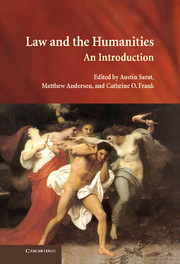Book contents
- Frontmatter
- Contents
- Contributors
- Acknowledgments
- Introduction: On the Origins and Prospects of the Humanistic Study of Law
- I PERSPECTIVES ON THE HISTORY AND SIGNIFICANCE OF SCHOLARSHIP IN LAW AND THE HUMANITIES: THREE VIEWS
- II IDEAS OF JUSTICE
- III IMAGINING THE LAW
- IV LINGUISTIC, LITERARY, AND CULTURAL PROCESSES IN LAW
- V INSTITUTIONAL PROCESSES
- Index
- References
Introduction: On the Origins and Prospects of the Humanistic Study of Law
Published online by Cambridge University Press: 20 January 2010
- Frontmatter
- Contents
- Contributors
- Acknowledgments
- Introduction: On the Origins and Prospects of the Humanistic Study of Law
- I PERSPECTIVES ON THE HISTORY AND SIGNIFICANCE OF SCHOLARSHIP IN LAW AND THE HUMANITIES: THREE VIEWS
- II IDEAS OF JUSTICE
- III IMAGINING THE LAW
- IV LINGUISTIC, LITERARY, AND CULTURAL PROCESSES IN LAW
- V INSTITUTIONAL PROCESSES
- Index
- References
Summary
[It is] a fact too often forgotten – that law touches at some point every conceivable human interest, and that its study is, perhaps above all others, precisely the one which leads straight to the humanities.
– Ernest W. Huffcutt “The Literature of Law” (1892)At the start of the twenty-first century, interdisciplinary is the watchword in legal education and legal scholarship. In law schools and within the liberal arts, practitioners of various “law and” movements find themselves much in demand. Law and economics, law and social science, law and history, empirical legal studies: These labels are by now quite familiar. One of the most recent of these “law ands” is the burgeoning field of Law and the Humanities.
Today, scholars in that field are supported by a well-developed infrastructure of professional associations and scholarly journals, but the precise contours of this field are anything but clear. What is its relationship to law and literature? What, if any, relationship does it have to the qualitative social sciences, for example, anthropology? In addition, there are open questions about the significance of Law and Humanities work. What payoff does work in the humanities promise for legal scholarship and legal understanding? How does the examination of law enrich the humanities?
Law and the Humanities: An Introduction brings together a distinguished group of scholars from law schools and an array of the disciplines in the humanities to address those questions.
- Type
- Chapter
- Information
- Law and the HumanitiesAn Introduction, pp. 1 - 46Publisher: Cambridge University PressPrint publication year: 2009
References
- 1
- Cited by



